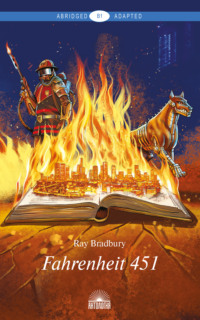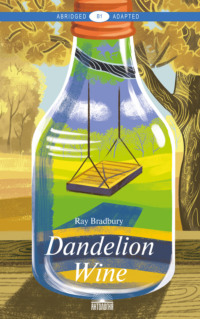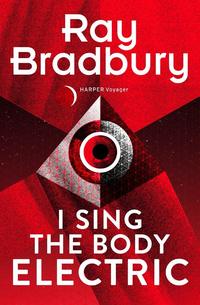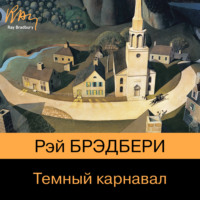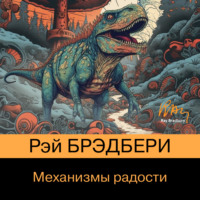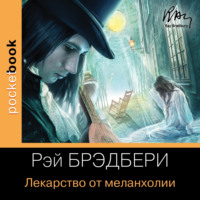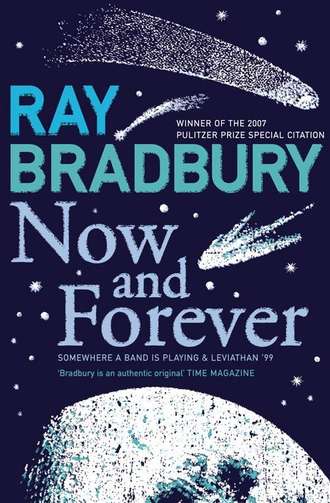
Полная версия
Now and Forever
Cardiff took another step and knew he would sleep nine hours a night here and wake like a boy at dawn, excited that he was alive, and all the world beginning, morn after morn, glad for his heart in his body, and his pulse in his wrists.
He heard someone laughing. And it was himself, overwhelmed with a joy he could not explain.
There was the merest motion from somewhere high in the house. Cardiff looked up.
Descending the stairs, and pausing now at seeing him, was the most beautiful woman in the world.
Somewhere, sometime, he had heard someone say: Fix the image before it fades. So said the first cameras that trapped light and carried that illumination to obscuras where chemicals laid out in porcelain caused the trapped ghosts to rouse. Faces caught at noon were summoned up out of sour baths to reestablish their eyes, their mouths, and then the haunting flesh of beauty or arrogance, or the impatience of a child held still. In darkness the phantoms lurked in chemicals until some gestures surfaced them out of time into a forever that could be held in the hands long after the warm flesh had vanished.
It was thus and so with this woman, this bright noon wonder who descended the stairs into the cool shadow of the hall only to reemerge in a shaft of sunlight in the dining room door. Her hand drifted to take Cardiff’s hand, and then her wrist and arm and shoulder and at last, as from that chemistry in an obscura room, the ghost of a face so lovely it burst on him like a flower when the dawn causes it to widen its beauty. Her measuring bright and summer-electric eyes shone merrily, watching him, as if he, too, had just arisen from those miraculous tides in which memory swims, as if to say: Remember me?
I do! he thought.
Yes? he thought he heard her say.
Yes! he cried, not speaking. I always hoped I might remember you.
Well, then, her eyes said, we shall be friends. Perhaps in another time, we met.
‘They’re waiting for us,’ she said aloud.
Yes, he thought, for both of us!
And now he spoke. ‘Your name?’
But you already know it, her silence replied.
And it was the name of a woman dead these four thousand years and lost in Egyptian sands, and now refreshed at noon in another desert near an empty station and silent tracks.
‘Nefertiti,’ he said. ‘A fine name. It means the Beautiful One Is Here.’
‘Ah,’ she said, ‘you know.’
‘Tutankhamen came from the tomb when I was three,’ he said. ‘I saw his golden mask and wanted my face to be his.’
‘But it is,’ she said. ‘You just never noticed.’
‘Can I believe that?’
‘Believe it and it will happen in the midst of your belief. Are you hungry?’
Starved, he thought, staring at her.
‘Before you fall,’ she laughed, ‘come.’
And she led him in to a feasting of summer gods.
EIGHT
The dining room, like the porch, was the longest one he’d ever seen.
All of the summer porch people were lined up on either side of an incredible table, staring at Cardiff and Nef as they came through the door.
At the far end were two chairs waiting for them and as soon as Cardiff and Nef sat, there was a flurry of activity as utensils were raised and platters passed.
There was an incredible salad, an amazing omelet, and a soup smooth as velvet. From the kitchen drifted a scent that promised a dessert sweet as ambrosia.
In the middle of his astonishment, Cardiff said, ‘Hold on, this is too much. I must see.’
He rose and walked to a door at the end of the dining room, which opened into the kitchen.
Entering the kitchen, he stared across the room at what seemed a familiar doorway.
He knew where it led.
The pantry.
And not just any pantry, but his grandmother’s pantry, or something just like it. How could that be?
He stepped forward and pushed the door, half-expecting that he would find his grandmother within, lost in that special jungle where hung leopard bananas, where doughnuts were buried in quicksands of powdered sugar. Where apples shone in bins and peaches displayed their warm summer cheeks. Where row on row, shelf on shelf, of condiments and spices rose to an always-twilight ceiling.
He heard himself intoning the names that he read off the jar labels, the monikers of Indian princes and Arabian wanderers.
Cardimon and anise and cinnamon were there, and cayenne and curry. Added to which there were ginger and paprika and thyme and celandrine.
He could almost have sung the syllables and awakened at night to hear himself humming the sounds all over again.
He scanned and re-scanned the shelves, took a deep breath, and turned, looking back into the kitchen, sure he would find a familiar shape bent over the table, preparing the last courses for the amazing lunch.
He saw a portly woman icing a buttery yellow cake with dark chocolate, and he thought if he cried her name, his grandmother might turn and rush to hold him.
But he said nothing and watched the woman finish the job with a flourish, and hand the cake to a maid who carried it out into the dining room.
He went back to join Nef, his appetite gone, having fed himself in the pantry wilderness, which was more than enough.
Nef, he thought, gazing at her, is a woman of all women, a beauty of all beauties. That wheat field painted again and again by Monet that became the wheat field. That church façade similarly painted, again and again, until it was the most perfect façade in the history of churches. That bright apple and fabled orange by Cézanne that never fades.
‘Mr Cardiff,’ he heard her say. ‘Sit, eat. You mustn’t keep me waiting. I’ve been waiting too many years.’
He drew close, not able to take his eyes away from her.
‘Great god,’ he said. ‘How old are you?’
‘You tell me,’ she said.
‘Oh, hell,’ he cried. ‘You were born maybe twenty years ago. Thirty. Or the day before yesterday.’
‘I am all of those.’
‘How?’
‘I am your sister, your daughter, and someone you knew years ago back in school, yes? I am the girl you asked to the Senior Prom but she had promised another.’
‘That’s my life. That happened. How did you guess?’
‘I never guess,’ she replied. ‘I know. The important thing is that you’re here at last.’
‘You sound as if you expected me.’
‘Forever,’ she said.
‘But I didn’t know I was coming here until last night, in the middle of a dream. I fixed my mind only at the last moment. I decided to write a story …’
She laughed quietly. ‘How can that be? It sounds so like those unhealthy romances written by healthy housewives. What made you choose Summerton? Was it our name?’
‘I saw a postcard someone must have picked up on their way through.’
‘Oh, that would have been years ago.’
‘It looked like a nice town – a friendly spot for tourists looking for a place to relax, enjoy the desert air. But then, I looked for it on the map. And you know what? It’s not on any map I could find.’
‘Well, the train doesn’t stop here.’
‘It didn’t stop today,’ he admitted. ‘Only two things got off: me and my suitcase.’
‘You travel lightly.’
‘I’m just here overnight. When the next train runs through, not stopping, I’ll grab on.’
‘No,’ she said softly. ‘That’s not how it’s supposed to be.’
‘I’ve got to go home and finish my story,’ he insisted.
‘Ah, yes,’ she said. ‘And what will you say about this town that no one can find?’
A cloud crossed the sky and the dining room windows darkened, and a shadow fell across his face. There were two truths to tell, but he could tell only one.
‘That it’s a lovely town,’ he said, lamely. ‘The kind that doesn’t exist anymore. That people should remember and celebrate. But how did you know I was coming?’
‘I woke at dawn,’ she said. ‘I heard your train from a long way off. By noon the train was just beyond the mountains, and I heard its whistle.’
‘And did you expect someone named Cardiff?’
‘Cardiff?’ she wondered. ‘There was a giant, once—’
‘In all the newspapers. A fraud.’
‘And,’ she said. ‘Are you a fraud?’
He could not meet her gaze.
NINE
When he looked up, Nef’s chair was empty. The other diners, too, had all left the table, gone back to their rocking chairs or, perhaps, to summer afternoon naps.
‘Lord,’ he murmured. ‘That woman, young, but how young? Old, but how old?’
Suddenly Elias Culpepper touched his elbow.
‘You want a real tour of our town? Claude needs to deliver some more fresh-baked bread. On your feet!’
The wagon was loaded with a redolent harvest. The warm loaves had been neatly stacked row on row within the oven-smelling wagon, thirty or forty loaves in all, with names lettered on the wax-paper wrappings. Beside these were waxed boxes of muffins and cakes, carefully tied with string.
Cardiff took three immense inhalations and almost fell with the overconsumption.
Culpepper handed him a small packet and a knife.
‘What’s this?’ said Cardiff.
‘You won’t be a block away before the bread overcomes you. This is a butter knife. This here is a full loaf. Don’t bring it back.’
‘It’ll ruin my supper.’
‘No. Enhance. Summer outside. Summer inside.’
He handed over a pad with names and addresses.
‘Just in case,’ said Culpepper.
‘You’re sending me out on my own? How do I know where to go?’
‘Don’t you worry. Claude knows the way. Never got lost yet. Right, Claude?’
Claude looked back, neither amused nor serious, just ready.
‘Just go easy on the reins. Claude’s got his own system. You just tag along. It’s the only way to see the town without any jabber from me. Giddap.’
Cardiff jumped aboard. Claude tugged, the wagon lurched forward.
‘Hell.’ He fumbled with the notebook, scanning the names and addresses. ‘What’s the first stop?’
‘Git!’
The bread wagon drifted away, warming the air with the heady scents of yeast and grain.
Claude trotted as if he could hardly wait to be right.
TEN
Claude jogged at a goodly pace for two blocks and turned sweetly to the right.
His eyes twitched toward a front yard mailbox: Abercrombie.
Cardiff checked his list.
Abercrombie!
‘Damn!’
He jumped from the wagon, loaf in hand, when a woman’s voice called, ‘Thank you, Claude.’
A woman of some forty years stood at the gate to take the bread. ‘You, too, of course,’ she said. ‘Mister …?’
‘Cardiff, ma’m.’
‘Claude,’ she called, ‘take good care of Mr Cardiff. And Mr Cardiff, you take good care of Claude. Morning!’
And the wagon jounced along the bricks under a congress of trees that laced themselves to lattice out the sun.
‘Fillmore’s next.’ Cardiff eyed the list, ready to pull on the reins when the horse stopped at a second gate.
Cardiff popped the bread in the Fillmore mailbox and raced to catch up with Claude, who had resumed his route without waiting for his driver.
So it went. Bramble. Jones. Williams. Isaacson. Meredith. Bread. Cake. Bread. Muffins. Bread. Cake. Bread.
Claude turned a final corner.
And there was a school.
‘Hold up, Claude!’
Cardiff alighted and walked into the schoolyard to find a teeter-totter, its old blue paint flaking, next to an old swingset, its splintery wooden seats suspended from rusted iron chains.
‘Well, now,’ whispered Cardiff.
The school was two stories high. Its double doors were shut, and all eight of its windows were crusted with dust.
Cardiff rattled the front doors. Locked tight.
‘It’s only May,’ Cardiff said to himself. ‘School’s not out yet.’
Claude whinnied irritably, and perhaps out of pique, began a slow glide away from the school.
‘Claude!’ Cardiff put iron in it. ‘Stay!’
Claude stayed, drumming the bricks with both forefeet.
Cardiff turned back to the building. Carved in the lintel, above the main door were the words: SUMMERTON GRAMMAR SCHOOL, DEDICATED JANUARY 1ST, 1888.
‘Eighteen eighty-eight,’ Cardiff muttered. ‘Well, now.’
He gave one last look at the dust-caked windows and the rusted swing chains and said, ‘One last go-round, Claude.’
Claude did not move.
‘We’re all out of bread and names, is that it? You only take bakery orders, nothing else?’
Even Claude’s shadow did not move.
‘Well, we’ll just stand here until you do me a favor. Your new star boarder wants to cross-section the whole blasted town. What’s it to be? No water, no oats, without a full trot.’
Water and oats did it.
Full trot.
They sailed down Clover Avenue and up Hibiscus Way and over on to Rosewood Place and right on Juneglade and left again on Sandalwood then Ravine, which ran off the edge of a shallow ravine cut by ancient rains. He stared at lawn after lawn after lawn, all of them lush, green, perfect. No baseball bats. No baseballs. No basketball hoops. No basketballs. No tennis rackets. No croquet mallets. No hopscotch chalk marks on sidewalks. No tire swings on trees.
Claude trotted him back to the Egyptian View Arms, where Elias Culpepper was waiting.
Cardiff climbed down from the bread wagon.
‘Well?’
Cardiff looked back at the summer drift of green lawns and green hedges and golden sunflowers and said, ‘Where are the children?’
ELEVEN
Mr Culpepper did not immediately respond.
For dead ahead there was afternoon high tea, with apricot and peach tarts and strawberry delight and coffee instead of tea and then port instead of coffee and then there was dinner, a real humdinger, that lasted until well after nine and then the inhabitants of the Egyptian View Arms headed up, one by one, to their most welcome cool summer night beds, and Cardiff sat out on the croquetless and hoopless lawn, watching Mr Culpepper on the porch, smoking several small bonfire pipes, waiting.
At last Cardiff, in full brooding pace, arrived at the bottom of the porch rail and waited.
‘You were asking about no children?’ said Elias Culpepper.
Cardiff nodded.
‘A good reporter wouldn’t allow so much time to pass after asking such an important question.’
‘More time is passing right now,’ said Cardiff, gently, climbing the porch steps.
‘So it is. Here.’
A bottle of wine and two small snifters sat on the railing.
Cardiff drained his at a jolt, and went to sit next to Elias Culpepper.
Culpepper puffed smoke. ‘We have,’ he said, seeming to consider his words with care, ‘sent all the children away to school.’
Cardiff stared. ‘The whole town? Every child?’
‘That’s the sum. It’s a hundred miles to Phoenix in one direction. Two hundred to Tucson. Nothing but sand and petrified forest in between. The children need schools with proper trees. We got proper trees here, yes, but we can’t hire teachers to teach here. We did, at one time, but they got too lonesome. They wouldn’t come, so our children had to go.’
‘If I came back in late June would I meet the kids coming home for the summer?’
Culpepper held still, much like Claude.
‘I said—’
‘I heard.’ Culpepper knocked the sparking ash from his pipe. ‘If I said yes, would you believe me?’
Cardiff shook his head.
‘You implying I’m a mile off from the truth?’
‘I’m only implying,’ Cardiff said, ‘that we are at a taffy pull. I’m waiting to see how far you pull it.’
Culpepper smiled.
‘The children aren’t coming home. They have chosen summer school in Amherst, Providence, and Sag Harbor. One is even in Mystic Seaport. Ain’t that a fine sound? Mystic. I sat there once in a thunderstorm reading every other chapter of Moby-Dick.’
‘The children are not coming home,’ said Cardiff. ‘Can I guess why?’
The older man nodded, pipe in mouth, unlit.
Cardiff took out his notepad and stared at it.
‘The children of this town,’ he said at last, ‘won’t come home. Not one. None. Never.’
He closed the notepad and continued: ‘The reason why the children are never coming home is,’ he swallowed hard, ‘there are no children. Something happened a long time ago, God knows what, but it happened. And this town is a town of no family homecomings. The last child left long ago, or the last child finally grew up. And you’re one of them.’
‘Is that a question?’
‘No,’ said Cardiff. ‘An answer.’
Culpepper leaned back in his chair and shut his eyes. ‘You,’ he said, the smoke long gone from his pipe, ‘are an A-1 Four Star Headline News Reporter.’
TWELVE
‘I …,’ said Cardiff.
‘Enough,’ Culpepper interrupted. ‘For tonight.’
He held out another glass of bright amber wine. Cardiff drank. When he looked up, the front screen door of the Egyptian View Arms tapped shut. Someone went upstairs. His ambiance stayed.
Cardiff refilled his glass.
‘Never coming home. Never ever,’ he whispered.
And went up to bed.
Sleep well, someone said somewhere in the house. But he could not sleep. He lay, fully dressed, doing philosophical sums on the ceiling, erasing, adding, erasing again until he sat up abruptly and looked out across the meadow town of thousands of flowers in the midst of which houses rose and sank only to rise again, ships on a summer sea.
I will arise and go now, thought Cardiff, but not to a bee-loud glade. Rather, to a place of earthen silence and the sounds of death’s-head moths on powdery wings.
He slipped down the front hall stairs barefoot and once outside, let the screen door tap shut silently and, sitting on the lawn, put on his shoes as the moon rose.
Good, he thought, I won’t need a flashlight.
In the middle of the street he looked back. Was there someone at the screen door, a shadow, watching? He walked and then began to jog.
Imagine that you are Claude, he thought, his breath coming in quick pants. Turn here, now there, now another right and—
The graveyard.
All that cold marble crushed his heart and stopped his breathing. There was no iron fence around the burial park.
He entered silently and bent to touch the first gravestone. His fingers brushed the name: BIANCA SHERMAN BATES
And the date: BORN, JULY 3, 1882
And below that: R.I.P.
But no date of death.
The clouds covered the moon. He moved on to the next stone.
WILLIAM HENRY CLAY
1885—
R.I.P.
And again, no mortal date.
He brushed a third gravestone and found:
HENRIETTA PARKS
August 13, 1881
Gone to God
But, Cardiff knew, she had not as yet gone to God.
The moon darkened and then took strength from itself. It shone upon a small Grecian tomb not fifty feet away, a lodge of exquisite architecture, a miniature Acropolis upheld by four vestal virgins, or goddesses, beautiful maidens, wondrous women. His heart pulsed. All four marble women seemed suddenly alive, as if the pale light had awakened them, and they might step forth, unclad, into the tableau of named and dateless stones.
He sucked in his breath. His heart pulsed again.
For as he watched, one of the goddesses, one of the forever-beautiful maidens, trembled with the night chill and shifted out into the moonlight.
He could not tell if he was terrified or delighted. After all, it was late at night in this yard of the dead. But she? She was naked to the weather, or almost; a mist of silk covered her breasts and plumed around her waist as she drifted away from the other pale statues.
She moved among the stones, silent as the marble she had been but now was not, until she stood before him with her dark hair tousled about her small ears and her great eyes the color of lilacs. She raised her hand tenderly and smiled.
‘You,’ he whispered. ‘What are you doing here?’
She replied quietly, ‘Where else should I be?’
She held out her hand and led him in silence out of the graveyard.
Looking back he saw the abandoned puzzle of names and enigma of dates.
Everyone born, he thought, but none has died. The stones are blank, waiting for someone to date their ghosts bound for Eternity.
‘Yes?’ someone said. But her lips had not moved.
And you followed me, he thought, to stop me from reading the gravestones and asking questions. And what about the absent children, never coming home?
And as if they glided on ice, on a vast sea of moonlight, they arrived where a crowd of sunflowers hardly stirred as they passed and their feet were soundless, moving up the path to the porch and across the porch, and up the stairs, one, two, three floors until they reached a tower room where the door stood wide to reveal a bed as bright as a glacier, its covers thrown back, all snow on a hot summer night.
Yes, she said.
He sleepwalked the rest of the way. Behind him, he saw his clothes, like the discards of a careless child, strewn on the parquetry. He stood by the snowbank bed and thought, One last question. The graveyard. Are there bodies beneath the stones? Is anyone there?
But it was too late. Even as he opened his mouth to question, he tumbled into the snow.
And he was drowning in whiteness, crying out as he inhaled the light and then out of the rushing storm, a warmness came; he was touched and held, but could not see what or who held him, and he relaxed, drowned.
When next he woke, he was not swimming but floating. Somehow he had leaped from a cliff, and someone with him, unseen, as he soared up until lightning struck, tore at him in half terror, half joy, to fall and strike the bed with his entire body and his soul.
When he awoke again, the storm over, and the flying gone, he found a small hand in his, and without opening his eyes he knew that she lay beside him, her breath keeping time with his. It was not yet dawn.
She spoke.
‘Was there something you wanted to ask?’
‘Tomorrow,’ he whispered. ‘I’ll ask you then.’
‘Yes,’ she said quietly. ‘Then.’
Then, for the first time, it seemed, her mouth touched his.
THIRTEEN
He awoke to the sun pouring in through the high attic window. Questions gathered behind his tongue.
Beside him, the bed was empty.
Gone.
Afraid of the truth? he wondered.
No, he thought, she will have left a note on the icebox door. Somehow he knew. Go look.
The note was there.
Mr Cardiff:
Many tourists arriving. I must welcome them.
Questions at breakfast.
Nef.
Far off, wasn’t there the merest wail of a locomotive whistle, the softest churn of some great engine?
On the front porch, Cardiff listened, and again the faint locomotive cry stirred beyond the horizon.
He glanced up at the top floor. Had she fled toward that sound? Had the boarders heard, too?
He ran down to the rail station and stood in the middle of the blazing hot iron tracks, daring the whistle to sound again. But this time, silence.
Separate trains bringing what? he wondered.
I arrived first, he thought, the one who tries to be good.



